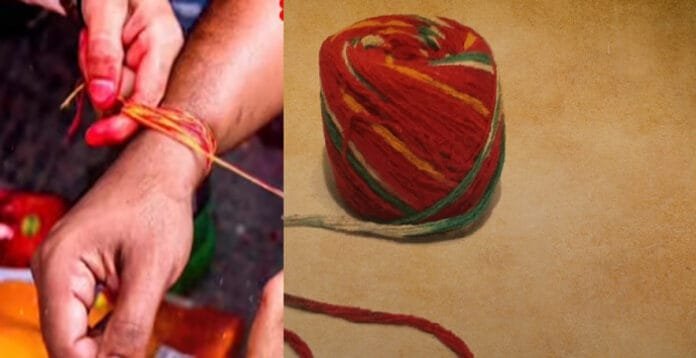Kalava: The Sacred Protection Thread in Hinduism You Shouldn’t Ignore
In Hinduism, Kalava—also known as Mauli, Rakshasutra, or Chardu—is not just a red and yellow thread. It’s a divine symbol of protection, purity, and positive energy. Tied during pujas or auspicious beginnings, this sacred thread holds cosmic and astrological significance that many overlook.
Let’s dive into the spiritual secrets, rules, and rituals of Kalava—and why following them can protect your health, energy, and fortune.
🧿 What Is Kalava and Why Is It Tied?
Kalava is a sacred cotton thread, typically red with yellow markings, that is tied on the wrist during rituals, pujas, or fasts. It acts as a shield against negative energies and symbolizes the blessings of deities like Lord Vishnu, Brahma, and Shiva.
Men and unmarried girls: Tie it on the right hand
Married women: Tie it on the left hand
🕉️ Kalava represents divine protection and spiritual discipline. It’s a daily reminder of one’s connection to higher energies.
⚠️ Why Kalava Should Be Removed After 21 Days
Though it may seem harmless to keep it tied indefinitely, Kalava should never be worn beyond 21 days. Here’s why:
After 21 days, the color begins to fade, and the thread absorbs negative vibrations from the body and surroundings.
A faded or worn-out Kalava can lead to Grah Dosh (planetary defects) and create energetic blockages in your life.
❗REMEMBER: A worn-out Kalava is no longer a protector—it becomes a magnet for negativity.
🧱 How to Properly Dispose of the Old Kalava
Do not throw the used Kalava in the trash or leave it lying around the house. Instead:
Remove it only on a Tuesday or Saturday – days ruled by Mars and Saturn.
Dig a small pit in clean soil and bury it respectfully.
🌍 Why bury in soil? Kalava represents the planet Mars, and Earth is the mother of Mars, making this act symbolically powerful for purification and peace.
🧵 Cotton Kalava vs. Silk Kalava: Choose Wisely
Always use a bright red cotton Kalava. According to priests and scriptures:
Cotton Kalava: Pure, absorbent, spiritually activated
Silk Kalava: Considered ineffective and materialistic
✅ Cotton = Energy Conductor
❌ Silk = Decorative Only
🔮 The Powerful Mantra for Tying Kalava
While tying Kalava, it’s essential to chant or internally recite this ancient protection mantra:
“Yen Baddho Bali Raja, Danavendra Mahabalah,
Ten Tvam Manubadhnaami, Raksha Ma Chal Ma Chal”
This mantra was used to bind the mighty demon king Bali and is known for invoking divine protection and strength.
📿 Pro Tip: Chant this mantra even when tying Kalava to yourself or others for maximum spiritual benefit.
🪙 The Ritual of Offering Dakshina
While tying Kalava during a religious ceremony:
Hold a small amount of rice, sweets, or money in your fist.
Once the Kalava is tied, offer this as Dakshina (donation) to the priest or Brahmin performing the ritual.
This offering represents your sacrifice, gratitude, and faith in the process.
🔥 Final Thoughts: Respect the Ritual, Receive the Blessings
In today’s fast-paced world, rituals like tying Kalava may seem like mere tradition. But behind every thread is a spiritual science that governs energy, health, protection, and fortune.
🕯️ Tie it with belief. Remove it with respect. Dispose of it with care.
Whether you’re starting a new venture, performing a puja, or simply looking for spiritual grounding—let Kalava be your cosmic armor.
















